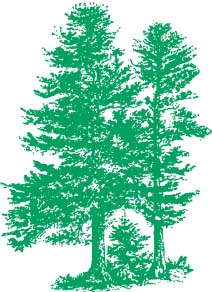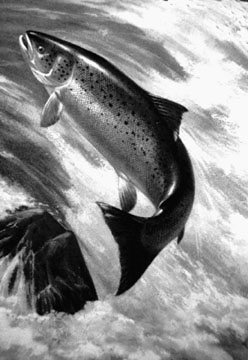 |
|
 |
|
|
On November 13, the federal government listed Atlantic salmon as "endangered" under the Endangered Species Act (ESA). This decision was directly related to legal action initiated by CAP almost two years ago. In January, 1999 CAP, Defenders of Wildlife, and eight other organizations and individuals sued the National Marine Fisheries Service (NMFS) and Fish and Wildlife Service (FWS) for violating the ESA by not listing the salmon and instead relying on an agreement that the state of Maine would develop its own conservation measures. In June, the federal agencies and the conservation groups signed off on a legally binding settlement that the agencies would decide whether to list Atlantic salmon by Nov. 17. One of the primary opponents of protecting the wild Atlantic salmon has been Maine Gov. Angus King. The Governor claims that with so few wild salmon left - an estimated 200 in eight rivers - and so many hatchery fish, the fish are no longer native or wild. His solution? More studies before any decision is made. The Governor has threatened to legally challenge the listing.  Atlantic salmon survival is threatened by increased logging in Maine's watersheds, chemical use from agriculture, and introduction of non-native aquaculture salmon that escape from pens and breed with wild salmon. Other threats include diseases introduced by aquaculture operations, erosion from ATV/snowmobile trails, and impacts from acid rain.
Another threat is the increased level of aluminum in the rivers (see article in this issue "Cleaner Air, Stronger Trees, Healthy Lakes" by Michael Hamilton). Recent tests have found the soils around some Down East rivers are leaching out into the streams. The Pleasant and Narraguagus rivers appear to have the most serious problems with aluminum. Aluminum-a by-product of acid rain-degrades fish gills by interfering with the salmon's ability to regulate the levels of salt in their bodies. Aluminum can kill salmon because the salts leak from their bodies. Even if the fish doesn't die right away, it has to put more energy into counteracting the salt problem. Water containing high levels of aluminum in Nova Scotia is a serious problem and is being blamed for the disappearance of Atlantic salmon in 33 of the 45 salmon streams on the eastern side of the Canadian Province. The listing will take effect in 30 days and the federal government will have about 30 months to develop a final plan to bring back the fish. The listing covers the wild population of Atlantic salmon found in rivers and streams in Maine from the lower Kennebec River north to the US-Canada border. These include the Dennys, East Machias, Machias, Narraguagus and Pleasant rivers in Washington County; Cove Brook, a tributary of the Penobscot River in Winterport; the Ducktrap River in Waldo County, and the Sheepscot River in Lincoln County. Federal officials said that the Penobscot River and some coastal streams could be added to the area covered by the listing at a later date. This year, only 27 wild adult salmon were documented as returning
to the eight rivers. In the Dennys River, only one wild fish
was found, while 29 aquaculture escapees were documented. Joining the Conservation Action Project and Defenders of Wildlife in the Atlantic salmon listing efforts are the Biodiversity Legal Foundation, Coastal Waters Project, Forest Ecology Network, Charles FitzGerald, Douglas Watts, Donald Shields, Arthur Taylor, and David Carle. Howard Crystal of the Washington, DC-based law firm Meyer and Glitzenstein represented the parties in the legal action. David Carle is the executive director of the |
283 Water Street, 3rd floor, P.O. Box 2118, Augusta, Maine 04338 phone: 207-628-6404 fax - 207-628-5741 email: fen@powerlink.net